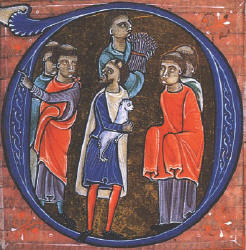 quelibet persona loca sue proprietatis
uendens aut donans, prouentum decimationum ab ecclesia <fol. 112> cui
legitime assignatus est nullo potest iure abstrahere. Nec isti de diocesi ad
diocesi transeuntes decimas suorum prediorum que intra terminos nostre
parrochie continentur nobis auferre possunt. Quantum enim ad ius
percipiendarum decimarum attinet, idem est possessorem de dioecesi ad
dioecesim transire, quod possessionem de dioecesano ad
dioecesanum
transferri.
quelibet persona loca sue proprietatis
uendens aut donans, prouentum decimationum ab ecclesia <fol. 112> cui
legitime assignatus est nullo potest iure abstrahere. Nec isti de diocesi ad
diocesi transeuntes decimas suorum prediorum que intra terminos nostre
parrochie continentur nobis auferre possunt. Quantum enim ad ius
percipiendarum decimarum attinet, idem est possessorem de dioecesi ad
dioecesim transire, quod possessionem de dioecesano ad
dioecesanum
transferri. Cambridge, Corpus Christi College 10, fol. 181: Causa 13
<Plaintiff> We can easily prove that these tithes are not yours. In a certain chapter it is read "Si quis laicus uel clericus seu utriusque sexus proprietatis sue loca, etc. Gratian: this chapter can be found in the Causa monachorum. If therefore a laymen or a cleric or any person sells or donates the lands to which he has rights, the income of tithes which are legitimately assigned cannot be taken away by any law. Those who move from diocese to diocese cannot take away the tithes of their lands that lie within our diocese from us. As far as the right of receiving tithes is concerned, it is the same if the possessor of lands moves from diocese to diocese as the possession would be moved from bishop to bishop.